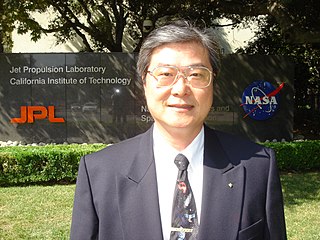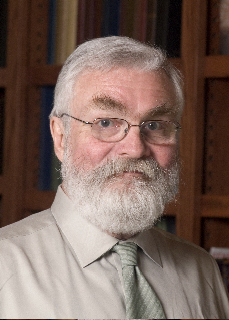Related Research Articles

Charles Eric Leiserson is a computer scientist and professor at Massachusetts Institute of Technology (M.I.T.). He specializes in the theory of parallel computing and distributed computing.
Robert J. McEliece was the Allen E. Puckett Professor and a professor of electrical engineering at the California Institute of Technology (Caltech) best known for his work in error-correcting coding and information theory. He was the 2004 recipient of the Claude E. Shannon Award and the 2009 recipient of the IEEE Alexander Graham Bell Medal. He was a life fellow of the IEEE and was elected to the National Academy of Engineering in 1998.
Mac Elwyn Van Valkenburg was an American electrical engineer and university professor. He wrote seven textbooks and numerous scientific publications.

Thomas M. Cover [ˈkoʊvər] was an American information theorist and professor jointly in the Departments of Electrical Engineering and Statistics at Stanford University. He devoted almost his entire career to developing the relationship between information theory and statistics.

John Roy Whinnery was an American electrical engineer and educator who worked in the fields of microwave theory and laser experimentation.

Eduardo Daniel Sontag is an Argentine-American mathematician, and distinguished university professor at Northeastern University, who works in the fields control theory, dynamical systems, systems molecular biology, cancer and immunology, theoretical computer science, neural networks, and computational biology.
Giovanni De Micheli is a research scientist in electronics and computer science. He is credited for the invention of the Network on a Chip design automation paradigm and for the creation of algorithms and design tools for Electronic Design Automation (EDA). He is Professor and Director of the Integrated Systems laboratory at École Polytechnique Fédérale de Lausanne (EPFL), Switzerland. Previously, he was Professor of Electrical Engineering at Stanford University. He was Director of the Electrical Engineering Institute at EPFL from 2008 to 2019 and program leader of the Swiss Federal Nano-Tera.ch program. He holds a Nuclear Engineer degree, a M.S. and a Ph.D. degree in Electrical Engineering and Computer Science under Alberto Sangiovanni-Vincentelli.
John Chi-Shing Lui is a Hong Kong computer scientist. He was the chairman of the Department of Computer Science & Engineering in the Chinese University of Hong Kong. He received his Ph.D. in computer science from UCLA. When he was a Ph.D. student at UCLA, he spent a summer working in IBM's Thomas J. Watson Research Center. After his graduation, he joined the IBM Almaden Research Laboratory/San Jose Laboratory and participated in various research and development projects on file systems and parallel I/O architectures. He later joined the Department of Computer Science and Engineering at the Chinese University of Hong Kong. For the past several summers, he has been a visiting professor in computer science departments at UCLA, Columbia University, University of Maryland at College Park, Purdue University, University of Massachusetts Amherst and Universita' degli Studi di Torino in Italy.
David G. Messerschmitt is an engineer and professor emeritus at the University of California, Berkeley in the Department of Electrical Engineering and Computer Sciences in the UC Berkeley College of Engineering. He retired from UC Berkeley in 2005. At present he is conducting research at Berkeley, is a visiting professor in the Software Business Laboratory at the Helsinki University of Technology, and is doing research on interstellar communications at the SETI Institute. Messerschmitt also serves on the Advisory Council of METI.
Edward Joseph McCluskey was a professor at Stanford University. He was a pioneer in the field of Electrical Engineering.
Roger Ware Brockett was an American control theorist and the An Wang Professor of Computer Science and Electrical Engineering at Harvard University, who founded the Harvard Robotics Laboratory in 1983.

Asad Ali Abidi is a Pakistani-American electrical engineer. He serves as a tenured professor at University of California, Los Angeles, and is the inaugural holder of the Abdus Salam Chair at the Lahore University of Management Sciences (LUMS). He is best known for pioneering RF CMOS technology during the late 1980s to early 1990s. As of 2008, the radio transceivers in all wireless networking devices and modern mobile phones are mass-produced as RF CMOS devices.

Wai-Chi Fang is a Taiwanese engineer.

Robert M. Gray is an American information theorist, and the Alcatel-Lucent Professor of Electrical Engineering at Stanford University in Palo Alto, California. He is best known for his contributions to quantization and compression, particularly the development of vector quantization.
Thomas H. Lee is a professor in the Department of Electrical Engineering at Stanford University. Lee's research focus has been on gigahertz-speed wireline and wireless integrated circuits built in conventional silicon technologies, particularly CMOS; microwave; and RF circuits.

John Mathew Cioffi is an American electrical engineer, educator and inventor who has made contributions in telecommunication system theory, specifically in coding theory and information theory. Best known as "the father of DSL," Cioffi's pioneering research was instrumental in making digital subscriber line (DSL) technology practical and has led to over 400 publications and more than 100 pending or issued patents, many of which are licensed.

Saraju Mohanty is an Indian-American professor of the Department of Computer Science and Engineering, and the director of the Smart Electronic Systems Laboratory, at the University of North Texas in Denton, Texas. Mohanty received a Glorious India Award – Rich and Famous NRIs of America in 2017 for his contributions to the discipline. Mohanty is a researcher in the areas of "smart electronics for smart cities/villages", "smart healthcare", "application-Specific things for efficient edge computing", and "methodologies for digital and mixed-signal hardware". He has made significant research contributions to security by design (SbD) for electronic systems, hardware-assisted security (HAS) and protection, high-level synthesis of digital signal processing (DSP) hardware, and mixed-signal integrated circuit computer-aided design and electronic design automation. Mohanty has been the editor-in-chief (EiC) of the IEEE Consumer Electronics Magazine during 2016-2021. He has held the Chair of the IEEE Computer Society's Technical Committee on Very Large Scale Integration during 2014-2018. He holds 4 US patents in the areas of his research, and has published 500 research articles and 5 books. He is ranked among top 2% faculty around the world in Computer Science and Engineering discipline as per the standardized citation metric adopted by the Public Library of Science Biology journal.
Thomas Marbory Antonsen Jr. is an American physicist, a Distinguished Professor in the Department of Physics and the Department of Electrical and Computer Engineering at the University of Maryland.
James F. Gibbons is an American electrical engineer and academic administrator. He is credited with starting the semiconductor device fabrication laboratory at Stanford University that enabled the semiconductor industry and created Silicon Valley.

Don L. DeVoe is an engineer recognized for his contributions to the fields of microelectromechanical systems (MEMS) and microfluidics. He is a Professor of Mechanical Engineering at the University of Maryland, College Park, where he serves as Associate Chair of Research and Administration in the Department of Mechanical Engineering. He is a Fischell Institute Fellow within the Robert E. Fischell Institute for Biomedical Devices, and holds affiliate faculty appointments in the Fischell Department of Bioengineering and Department of Chemical and Biomolecular Engineering at the University of Maryland.
References
- ↑ "Microsystems Laboratory".
- ↑ "IEEE - Fellows - N". Institute of Electrical and Electronics Engineers (IEEE). Archived from the original on 2012-09-26. Retrieved 2012-01-03.